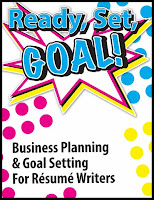 |
| National Career Summit Gold Package |
Here are some ideas on how you can use the recordings from The National Career Summit:
- For your own training/education. As resume writers, I believe we need to invest in our learning, so we can stay on top of cutting-edge strategies to help our clients. I try to attend at least one resume writing conference each year (you can read my thoughts on that here), plus there are dozens of opportunities to attend virtual sessions (the NRWA telesummits, Wendy Enelow and Louise Kursmark's E-Summits, The Academies' Virtual Bootcamp, etc.). With 30 sessions featuring the top industry leaders (Martin Yate, Laura Labovich, Miriam Salpeter, Louise Kursmark, Lisa Rangel ... and on and on ... that's about $3 per session. That's an unbelievable price. Heck, I'd pay $97 EACH to learn from almost ANY of these speakers for an hour! But you can also use this information to help your clients.
Here's how:
- For ideas for content to attract prospective clients. (No, you can't share the recordings.) But you can listen to the recording, then look at the session description (especially the "take-aways"), and write blog posts covering the main points. Or post on social media (be sure to credit the speaker, and mention "from The National Career Summit," when possible -- including your affiliate link for readers to purchase the Summit recordings and/or book). Or write a review of the book on your blog and/or social media and include the book link (it's just a $20 purchase)
- To educate your existing clients. Show how you are committed to continuing education (see bullet #1!) by sending a series of emails to your client list with key takeaways on the subject — including your own thoughts! — again, with an affiliate link to the book or the Gold package, and your contact information. These types of keep-in-touch emails can stimulate repeat business and referrals.
- To increase your profile on social media. Take a quote from a session (again, crediting the speaker and The National Career Summit), and Tweet it, do a Facebook business page post on it, or post it on your LinkedIn status. If you want to get even more mileage out of it, hire a designer for $5 on Fiverr.com to turn it into a graphic (an image and the quote) and it might even go viral on Facebook. Even better, make your post something interactive. Like "Author Wendy Lipton-Dibner says you really have to WANT a job to invest time/effort to get it, and that your motivation to land the job will increase if it's difficult to land. Is this true for your job search? Have you invested the time/energy to secure your dream job?" Many of the session presenters include quotable statements or statistics in their presentations.
However, if you're not planning on investing the TIME to go through and listen to the audios (at least the ones you think are the most relevant to the clients you work with, or the prospective clients you want to attract) — and then do something with the content (even if that's just taking notes for yourself and thinking through how these concepts can be applied to your work), then don't buy it.
Due to schedule conflicts, I was only able to listen to four of the sessions live (the sessions were free if you listened live), but I found the content to be so valuable from just those four sessions that I personally purchased the Gold package myself. There were a few sessions that aren't applicable to the clients I work with, but there were enough that were that I made the investment. (Plus, I wanted the print book you receive with the purchase of the Gold package, "101 Great Ways to Compete In Today's Job Market.")
If you want to check out what you get with the Gold package, click here:
The National Career Summit Gold Package
But remember, the special price of $97 (80% off the regular price of $497) is only valid through today (November 25, 2013). And that includes a copy of the printed book, shipped directly to you. That's a $20 value itself. So if you're going to buy the Gold package, I suggest you buy it now!
Due to schedule conflicts, I was only able to listen to four of the sessions live (the sessions were free if you listened live), but I found the content to be so valuable from just those four sessions that I personally purchased the Gold package myself. There were a few sessions that aren't applicable to the clients I work with, but there were enough that were that I made the investment. (Plus, I wanted the print book you receive with the purchase of the Gold package, "101 Great Ways to Compete In Today's Job Market.")
If you want to check out what you get with the Gold package, click here:
The National Career Summit Gold Package
But remember, the special price of $97 (80% off the regular price of $497) is only valid through today (November 25, 2013). And that includes a copy of the printed book, shipped directly to you. That's a $20 value itself. So if you're going to buy the Gold package, I suggest you buy it now!








